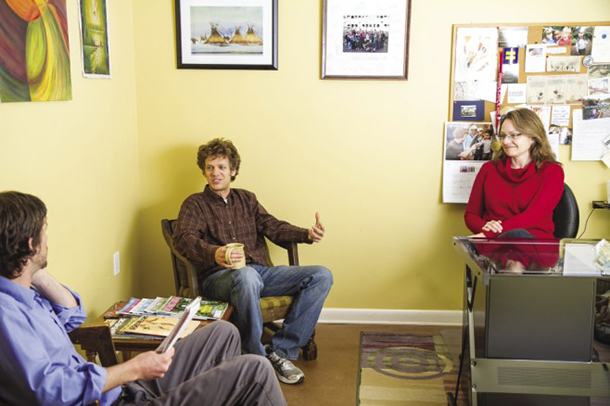Photos by Jon Styer.
Shoulder–to-Shoulder, a Washington D.C.-based interfaith coalition that works to end anti-Muslim sentiment in the United States, has its work cut out for it. Political campaigns throughout the 2012 election season made use of xenophobic language, and vandalism of mosques made headlines repeatedly over the past year, including an incident at a mosque a few miles from EMU.
As an intern with the organization, Bekah Enns ’13 has put to work her experience as a co-editor of The Weather Vane, EMU’s student newspaper, by producing a bi-weekly newsletter, compiling fact sheets, and otherwise pitching in on the group’s various initiatives and campaigns.
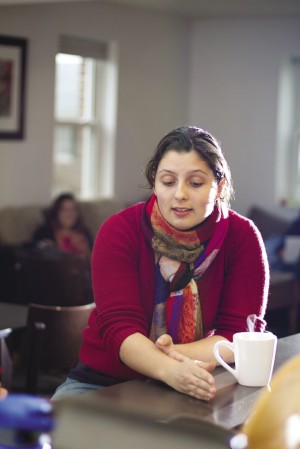
One of Shoulder-to-Shoulder’s priorities is trying to replace the commonly used label “Muslim American” with “American Muslim” – a term consciously chosen to emphasize to the “American-ness” that unites people of all faiths who live in the United States. While it seems a worthwhile project to Enns, she’s also well aware of how this appeal to secular, American values is somewhat at odds with the Mennonite tradition of emphasizing primary allegiance to God rather than country.
And so, Enns’ internship through EMU’s Washington Community Scholars’ Center, or WCSC, has become something more than just a taste of real-world work and an opportunity to develop contacts, ideas and credentials for life after college. It’s also a launching point for deeper examination of the relationship between faith, values and career.
“How do we as Mennonites engage the state, and how much do we build our alternative systems?” asks Enns, a history major with minors in political science, pre-law and peacebuilding and development.
What relationship, exactly, should a person of faith hold toward advocacy in a secular environment, she wonders? Doesn’t a faith like hers, one that prescribes action on behalf of the least among us, require this sort of entanglement with the wider world? But does this very entanglement with the wider world undermine the foundations of her faith?
Sitting at the kitchen table in the WCSC house, Enns – approaching the end of her semester in Washington – hasn’t hit on any answers to her questions yet. At the same time, she knows she would like to continue doing faith-based advocacy work after she graduates.
“Washington is often viewed as the quintessential ‘City on a Hill’ because of the power that exists here,” says Sheldon C. Good, WCSC assistant director. “And yet, Jesus professed an upside-down kingdom that turned power on its head, and that’s what students have to grapple with.”
Questions like those raised by Enns lie at the heart of the Washington Community Scholars’ Center experience, says Kimberly Schmidt, the program’s director since 1999. While most internship programs in Washington D.C. focus on career-building, WCSC pushes students to think more broadly about vocation, where one’s work and one’s values align. Another key feature of the WCSC internship programs is its emphasis on serving other people rather than just one’s own interests.
“A lot of people come to D.C. and they just want to pad their résumés and network,” says Schmidt, who takes satisfaction in seeing students struggle with deeper questions during their WCSC experience. “But we really want our students to come in with an attitude of service.”
This concept of “servant-leadership” has been a part of the WCSC program since its inception in 1976 and remains very much at the center of its focus.
At the same time, that doesn’t mean that student internships remain limited to ones like Shoulder-to-Shoulder, with an overt mission of service or advocacy.
Instead, Schmidt and Good place students in a wide variety of internships that match career interests, and then work with them to “imagine themselves as servant-leaders in that particular sector.”
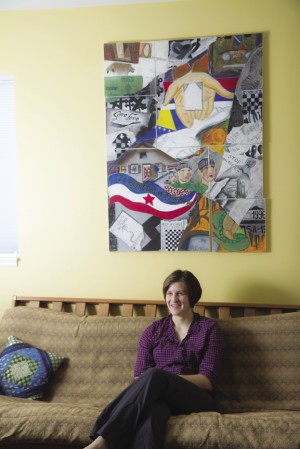
The academic component of the WCSC program places great emphasis on the differences, diversity and contradictions encountered by students during their semester in the city. A student’s day could begin in one of the poorest neighborhoods in the country and could end at the Kennedy Center, a few miles away and several worlds apart. Schmidt and former associate director Doug Hertzler ’88 (after more than a decade with the program, he took a new job in the late fall of 2012) intentionally expose students to these different realities – “polarities and disparities,” as Schmidt refers to them – during the seminars on urban history, anthropology and life that the directors lead each semester.
“I didn’t know what ‘gentrification’ meant before coming here this semester,” says Christine Baer ’14, calling her class in urban anthropology one of the highlights of her WCSC experience.
Through a variety of field trips, guest speakers and readings, she and her classmates studied the dynamics of race, class and politics at work in the rapidly changing city. (Since WCSC was established in the ’70s, for example, the African-American share of the city’s population has fallen from 70 percent to 50 percent.)
Like many in the WCSC program, Baer finds city life exhilarating. After graduation, she plans to look for work in the human services field in a large city, with D.C. high on her list.
The endless opportunity for new experiences, encounters and entertainment, the public transportation that zips you around, the crowds, everything seemingly at her fingertips – all of these are also a highlight of the experience for Taylor Swantz ’13.
“I love the city,” says Swantz, who grew up in rural Iowa and has an internship with a psychologist at a therapy center in College Park, Maryland.
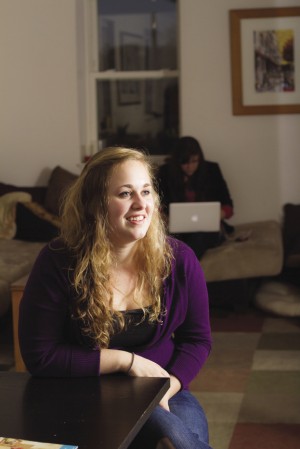
Good points out that it’s simply fun to live in one of the world’s most important cities.
“Students have plenty of opportunities to experience city life and build community together,” he says.
(The night before Crossroads’ visit to the WCSC program, several students were out late, taking in the spectacle of President Barack Obama’s re-election outside the White House and along U Street, where celebration erupted after the result was announced.)
But even when there are great times to be had and great questions to ponder, there are still groceries to buy and bathrooms to clean, and here again, WCSC students are thrust into the real (and banal) world, where there is no cafeteria or custodial staff to lean on.
Because she is one of the few students with a car in the city, Baer became one of the grocery shoppers, making regular trips to Aldis for the deals and Giant for everything else, plus a few agreed-upon luxuries, like caramel macchiato-flavored coffee creamer. She and her classmates also have organized weekly meetings and set up cooking and cleaning rotations to keep the house in order – tasks that the WCSC staffers leave up to the students to figure out.
“I feel more adult here,” says Kiersten Rossetto ’13, mentioning the greater freedoms and greater responsibilities given students in WCSC compared to life on campus in Harrisonburg.
While Schmidt and the rest of the WCSC staff emphasize the way the program develops students beyond simple career enhancement, job opportunities frequently do present themselves through the internships in D.C. During some semesters, 90 percent of the students have received job offers through, or directly because of, their internship placements, Schmidt says.
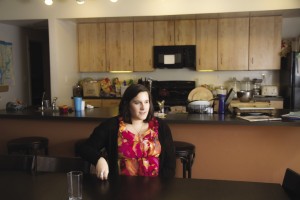
And even when the internship doesn’t culminate in a full-fledged job, the experience at the very least lets students give the urban vocation a full-dress rehearsal.
Baer, interning with Maryland Citizens Against State Executions, has both enjoyed her work assisting the organization in its campaign to abolish the death penalty in Maryland, and figured out that working on a policy level – emailing, letter-writing, bending legislators’ ears – is a little too impersonal for her tastes.
“It is really valuable work, but I think I get my energy elsewhere,” says Baer, who has figured out over the course of the semester that she prefers service and advocacy work that involves more direct contact with constituents.
Rossetto, an intern with the immigrant advocacy group Casa de Maryland, feels very much drawn to that field, which she also studied from a very different angle as a student on EMU’s Guatemala and U.S.-Mexico border cross-cultural. Now considering work with the Peace Corps or Mennonite Central Committee, though, Rossetto isn’t yet exactly sure where or how her skills and values frame a vocational calling.
“I really like nonprofit work and organizing, but I’m still on that journey,” Rossetto says. “I’m still figuring it out.” — Andrew Jenner ’04
